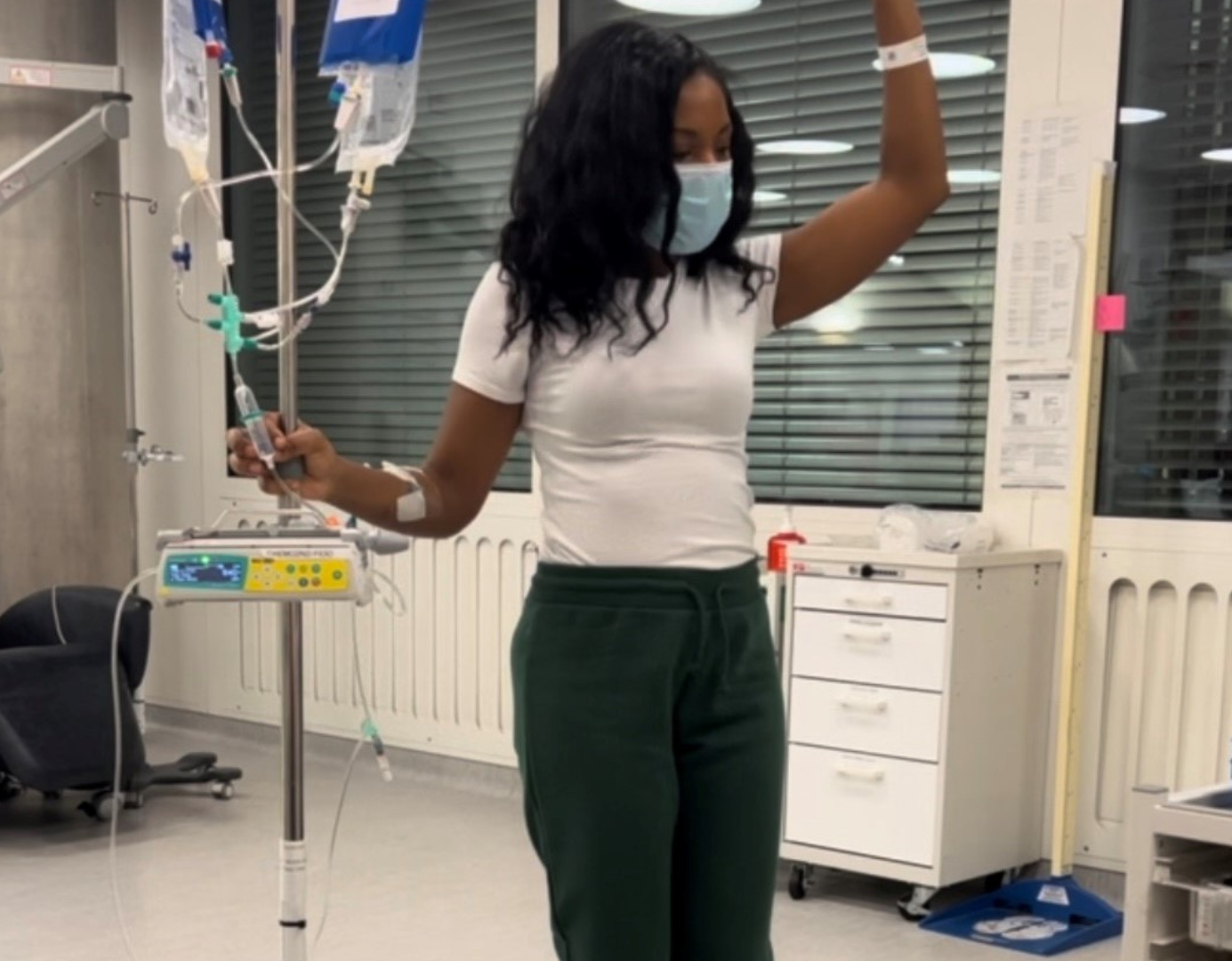Jacqueline's story
Published on: 5 October 2023Jacqueline shares her experience of being diagnosed with two different types of non-Hodgkin lymphoma.

"I had just started a new job as an events manager back in the Summer of 2022, managing international events in a really high-pressure environment. With the new full time role, as well as being a mum of two, I was having the time of my life.
I was 37 and fit and healthy, but noticed that I had a lump in the soft tissue to the right of my nose. I thought it best to get it checked out by my GP, who sent me for an ultrasound. I was shocked to hear that the medical team thought it was cancerous. Initially, I had suspected sarcoma (cancer that grows in connective tissue) but an MRI, PET/CT scan and needle biopsy revealed that I had lymphoma. At that stage it wasn’t clear as to what type of lymphoma it was, but a further analysis of the biopsies confirmed quite an unusual diagnosis – a mixture of both follicular lymphoma and diffuse large B-cell lymphoma (DLBCL), two types of non-Hodgkin lymphoma.
I started my chemotherapy treatment the day before my birthday in October 2022, receiving the first of six rounds of R-CHOP . The treatment was quite gruelling – I slept a lot, ate very little and it was at that point that I started to feel like a cancer patient. Up until that point I had experienced none of the classic symptoms of lymphoma and didn’t feel ill in the lead up to my diagnosis.
It was a difficult time juggling treatment with motherhood, and trying to avoid things like colds and chicken pox. In fact, I was hospitalised a few times because of viruses and temperatures. I was also put into a medical menopause during my first cycle of chemotherapy. For me, this added to my fear of whether the treatment was working as some of the symptoms of menopause - like night sweats - are also symptoms of lymphoma.
For me, finishing treatment is where I felt my journey actually began.
I finished my treatment in January 2023, and was told that there was no further evidence of disease. However, I am currently on long term active monitoring because of the follicular lymphoma aspect of my diagnosis. For me, finishing treatment is where I felt my journey actually began.
I had so much to process in terms of what had just happened. From treatment itself, through to decisions around fertility while at the same time navigating work and children. There were so many unknowns in such a short period of time. I had a lot to deal with emotionally as menopause can also affect your mental health. I think I just put all of my trauma in boxes throughout my treatment just to get through it. Now these boxes are opening and I am asking myself things like ‘did you really lose all your hair?’ and ‘did you really go through this?’.
I certainly have flashbacks to the things I went through and that I just had to get on with at the time. I am learning how to filter out the emotions I can control and those I can’t, while being gentle with myself. I feel I am in a unique space, and I am trying to understand who I am now within it.
I am no longer the Jacqueline before cancer, that version of me is gone. I feel I have been demolished physically and mentally, but am now working out how to put the pieces back together again and rebuild a new version of myself of which I can be proud of all I have overcome.
Lymphoma Action’s Live your Life programme has been incredibly helpful. I had such a great time on the course, and it highlighted some of those unknowns after cancer treatment that you may experience and worry about, like nutrition, sex and intimacy, and feelings and concerns around relapse. The nuances of returning to society after being out of action are quite tricky to navigate. Your body changes in ways you don’t expect so it was great to be on a course with others who had been through lymphoma as well. The online support meetings have also been really useful, particularly as they are grouped according to different situations and lymphoma types. Being on active monitoring brings its own set of challenges, so it is nice to share that space with people in the same situation.
My diagnosis certainly changed my perspective in life – you feel in control one minute and then cancer comes in and you realise you have little or no control over the big things that can happen to you. It was a hard lesson to learn, but it frees you up to appreciate the little things and when things are going well.
I am grateful for this second lease of life, and am really drawn to others who have gone through something similar. I have met people I would never have met, and have achieved positive things that I am proud of. But I am still navigating the waters post-treatment – the financial elements from not being able to work, the challenges of now having a hidden disability and the logistics around motherhood.
My hope for my children in the future is that they now have an awareness of their own body and that they shouldn’t be afraid of getting things checked if they don’t feel right as there are people out there who can help."
